Thandiwe Garusa
The exploitation and mining of gravel by the City of Harare (CoH) in Warren Park, a high-density suburb in Harare, has led to massive environmental damage, air pollution and death due to drowning in un-reclaimed pits, an investigation by NewZimbabwe.com has shown.
Gravel mining is taking place in the once picturesque Warren Hills where trenches have been dug between Warren Park D and Cold Comfort suburbs. One child has died in a pit between the two suburbs.
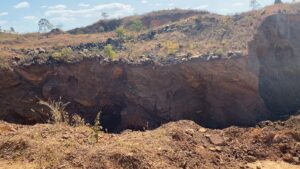
Crucially also, investigations by NewZimbabwe.com with support from Information for Development Trust under a program meant to support investigative reporting revealed that the pits have become a deadly death trap, accounting for four minor lives.
During a recent visit to the Warren Hills, this reporter observed 23 trucks leaving the hills in an hour. Each of the trucks was laden to the brim with extracted gravel. Gravel is being collected day and night every day.
State of the art machinery like tippers and excavators are being used to dig and transport the gravel.
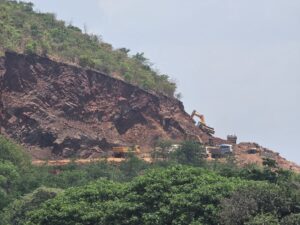
Death in Warren Park
In a series of tragic events that have shaken the Warren Park community, four young lives have been lost over the past few years due to drowning in abandoned pits.
Our investigations, which included interviewing residents, revealed that the deceased were all below 13.
Three minors, two from Warren Park 1 and one from Warren Park D drowned in abandoned pits at Warren Hills while another child drowned in a pit close to Cold Comfort which was also dug by CoH for sewer purposes.
Residents identified the deceased as Alex Tinotenda Chatira. He drowned on 13 May 2022 and was 11 at the time.
This reporter visited his family, which was however not willing to speak. The family however expressed their desire for CoH to stop gravel mining and rehabilitate trenches between Warren Park D and Cold Comfort.
“I do not have anything to say but I do not feel okay as a parent knowing the pit is still there a year later. We want these pits to be filled up,” said the deceased’s grandmother Theresa Fuka.
This reporter managed to locate Chatira’s grave at Warren Hills cemetery through leads from community members.
This reporter also spoke to a community-based organisation, Warren Park Infrastructure Development (WPID) Trust whose chairman Philosophy Nyapfumbi said the community was worried by the casualties.
“This is a disaster. We have lost four lives of children under the age of 13 through drowning in these ditches. We have tried talking to the authorities but they have not delivered what they promised,” Nyapfumbi said.
“The last kid we lost here was in 2022, during the rain season and the councillor and MP came to the funeral and promised to fill up all the ditches but as of today you can see there is water there.”
Nyapfumbi also said his organisation had appealed to CoH, the government and other stakeholders requesting that the gravel mining be stopped. Their pleas have however fallen on deaf ears.
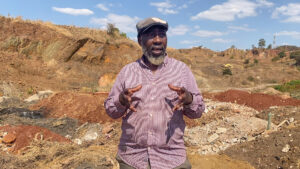
“We have written to EMA (Environmental Management Authority), City Council, Local Government ministry and the Mines ministry but they have not bothered to respond. We are pleading with them to stop gravel mining here and resurface the area. They should find somewhere they can dig, far from high-density suburbs where it’s dangerous for people. We appeal to them to think about the safety of people and consider the loss of life, especially the young ones,” he added.
In the request CoH, EMA, Mines Ministry, Environment and Tourism Ministry and Local Government Ministry dated 24 June 2022, WPID demanded information about the miners and proof of Environmental Impact Assessment (EIA), which was done before extraction began.
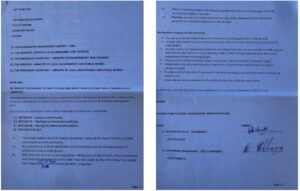
“Provide us with information about all contractors extracting gravel from Warren Hills and how they were awarded the contracts before consulting with all stakeholders, proof of consultations conducted, including all suburbs surrounding Warren Hills such as Warren Park 1 and 2, Warren Park D, Westlea, Cold Comfort, Kambuzuma and other interested stakeholders before extraction began,” the residents wrote.
“Provide proof of Environmental Impact Assessment conducted before extraction began. Immediately stop all gravel extraction operations at Warren Hills and relocate contractors somewhere else.
“Provide proof of retention of earnings to the local community derived from gravel extraction at Warren Hills. Cease, desist, restore and or resurface all trenches dug out by the contractors. We look forward to your expedited action to restore the beauty of Warren Park,” the letter reads.
The request was signed by representatives of WPID.
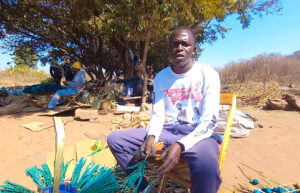
Kush Mamvura (pictured), who resides in Warren Park 1 said a four-year-old baby, whose mother was a tenant at their family home, died in an abandoned pit in 2020.
She moved out of the house soon after the funeral.
“We had a tenant who used to stay at our house with two kids, aged four and seven. As you know kids will always want to play, especially with water. It was very unfortunate that her daughter drowned in one of these gullies and was found floating after three days of searching,” he said.
“We are appealing to these guys to level the ground after they finish taking the gravel because they are leaving very huge pits which can hold large amounts of water. These have become a danger not only to children but to adults as well.”
Another 12-year-old boy (name withheld) from Warren Park drowned in 2022 while swimming with a friend in 2022.
His family has since relocated, but we located his friend’s family, who confirmed the incident.
The friend who was also 12 at the time, was relocated and changed schools.
The friend’s guardian, who still stays in Warren Park 1 said the death of his friend affected him negatively and he did not perform well in his Grade 7 examinations.
The guardian said the boy was traumatised and was hallucinating. He was also having nightmares for a long time after the incident and became anti-social.
“It is very unfortunate that you cannot do anything; kids will always be kids. They want to play and you cannot keep them indoors all the time. The boy suffered traumatic experiences and he kept seeing the incident in his mind.
“He used to cry and scream at night calling his friend’s name and we ended up looking for pastors to pray for him.
“We had to transfer him because we feared he may end up going back to the pit and die as well. As long as these open pits are still there, we are going to lose more children,” she said.
The treacherous open pits are haunting reminders of negligence.

Blessing Vera, who resides on Crescent Street in Warren Park 1, close to the police station confirmed that two children died due to drowning.
“About two years back, four students from Warren Park 5 Primary School were swimming in one of those pits and one drowned and was found after some days.
“This is something that affects the whole community, this is all because of other people’s negligence,” Vera said.
Mothers in Warren Park say they are living in constant fear.
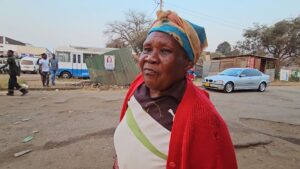
As a parent, a mother, it is extremely painful to lose a child in such a way and this is happening in our community.
“Every parent hopes their children will take care of them in future, so no parent wants to lose a child because of someone who is working to take care of their own children,” said Gogo Moyo, a Warren Park D resident.
“It is heartbreaking because no parent expects a child’s death,” added another mother.
Besides the deep pits in Warren Park hills, the investigations revealed that CoH is also leaving pits in the area when they do infrastructure repairs.
“Our children are drowning, council is leaving pits everywhere, I wonder if we are still in Harare or we are now in some artisanal mining community.
“They should come and fill up their pits, even the government should fix what is happening in our community,” added another woman who preferred to be anonymous but agreed to be recorded on video.
Police however denied all the death claims.
Harare provincial police spokesperson inspector Luckmore Chakanza said the Zimbabwe Republic Police has never received reports of any of these cases.
“We do not have such cases, there are no drowning cases in that area. The only incident that happened was when some children from Warren Park were swept away by a river,” Chakanza said.
Warren Park legislator Shakespear Hamauswa confirmed deaths but said he was unsure if they were reported.
“Some people do not make police reports but I have heard of these cases however I can confirm one death, I even attended the funeral of the child last year in Warren Park D who died due to drowning in one of the gullies there and a police report was made,” Hamauswa said.
“When EMA attended to that pit in Warren Park D, we asked them to also visit the hills as we were equally concerned. However, it seems EMA is not being proactive and seems to be powerless in terms of implementing laws, especially in an event whereby the involved culprits are linked to the politically powerful.
“As a community, we have also discussed how best we can all be proactive. Some people have applied to be given that land for residential stands and as the MP I was of the view that we can reclaim the land and put a home industry or any other land use that is approved by council.”
Infrastructural Damage
Our investigations also uncovered a dire situation that could have far-reaching consequences for several communities.
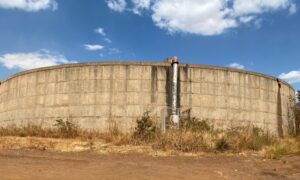
A vital water reservoir, which serves as a lifeline for several suburbs like Warren Park, Westlea, Kambuzuma, Kuwadzana and Cold Comfort has been weakened by the vibrations stemming from heavy machinery operating in the hills.
It has developed a massive crack in its walls and residents fear it could burst.
Residents fear nearby homes will be destroyed or flooded if the massive reservoir, which is perched on top of the hill, bursts.
William Mututa, WPID chairman for Warren Park 1 and 2 said: “The gravel miners are weakening the tensile strength of the reservoir and what will happen if it bursts given that we have houses very close to it?”
Amidst this grim tale of environmental havoc caused by extensive gravel mining, Warren Hills the once-pristine landscape now bears scars of destruction as infrastructure bears the brunt of this unchecked activity.
The infrastructure supporting communication networks in the area has suffered severe damage.
WiFi and telephone cables have been severed and so are cables from the network booster that enhance mobile network signals.
The tarred road that provided access to the water reservoir for essential maintenance services has also been destroyed. It has been reduced to a broken and impassable path and with no means which is not accessible by road.
Residents are also worried about their property values plummeting due to the surrounding environmental degradation.
The once-desirable area is now marked by its environmental degradation, causing residents to face not only the loss of natural beauty but also the erosion of their property’s worth as values plummet in the wake of the ongoing dust and air pollution.
“This is injustice to us as residents as we expect them to consult us. For the past years, they were using explosives causing damage to properties as some houses have cracked and definitely lost value at the end of the day.
“Even if you look at houses close by, the roofs and walls are now dirty, they are now red because of the dust coming from this mountain and property loses value,” Warren Park resident Simbarashe Majoko said.
Soil erosion, potential landslides and land pollution
Soil erosion and land degradation are rampant, leaving behind vast pits and treacherous trenches that threaten to transform into small rivers.
The stormwater drain once relied upon during heavy rains, now stands damaged and choked with mud, leading to surface water overflow.
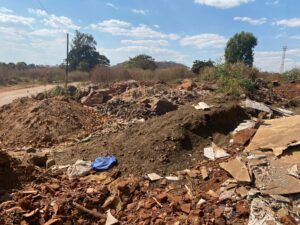
Beside roadsides, piles of unwanted rubble accumulate, a stark testament to the disregard for the environment.
The consequences extend beyond eyesore aesthetics, with the looming danger of potential landslides.
The air is tainted with dust, and pollution hangs thick, affecting the health of both the land and its inhabitants.
Soil erosion has had a major impact on the entire city, as the washed away finds its way to water bodies like Chivero and causes siltation.
“Rocks will fall and cause injuries, besides that soil erosion will cause the lake Chivero and the dam will dry up, where is the environmental unit, why is the government not stopping it?
“The situation is very bad, they will cause rock falls, they will create lagoons . The water can stay up to the next rainy season which is very dangerous, what is that?” added another Warren Park resident.
Lemonade out of lemons
Simbarashe Majoko, a Warren Park resident, said the community can reclaim its innocence and protect children from the unforgiving legacy of city council’s actions.
“Since the damage has already been done and there is so much ignorance from the City council and private players to fill up the gullies, we would suggest for the benefit of youths and everyone in the community if they can level up the place and out maybe recreational centers, some WiFi, anything that can be used by our youths instead off spending the time in the streets and taking drugs.
“We can make use of the place, we can make lemonade out of lemons so definitely if they can make a plan to stop the mining and make the use of the place positively. So I think if they can do that for use, then I think despite the damage that has been done, at least as residents we could have gained something.
Environmental Management Agency national spokesperson Amkela Sidange also said EMA was aware of the environmental damage and had already issued the city council with a protection order.
“Open pits left after mining activities remain a great threat to the public and environmental protection in general. Miners are therefore called upon to backfill all open pits and restore the land for productive use. Mining should be done sustainably without harming the environment.
“Warren Hills gravel extraction is owned and managed by the City of Harare and EMA has issued the city with an environmental protection order to put in dust suppression mechanisms and to submit an Environmental Management Plan for the gravel site,” Sidanke said.
Jacob Mafume, who was Harare’s mayor when the investigation was done, admitted that gravel extractors have permission from the local authority to mine the gravel.
He however urged the miners to be responsible.
“If it is council land then all the miners there should have licenses to operate however there are also sand poachers.
“We also do not want to see those gullies. We will tell the miners to stop. Everyone who is mining should be a responsible miner and take steps to ensure that they do not leave permanent damage at the place.
“We shall be asking our development control arm to go and monitor those processes so that people and the environment are not harmed,” Mafume said.
This story was commissioned by Information for Development Trust (IDT) and originally published by NewZimbabwe.com


Comments are closed.